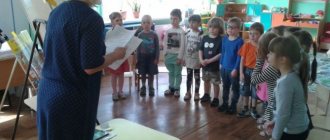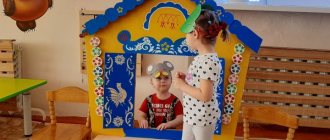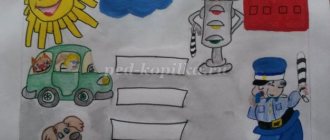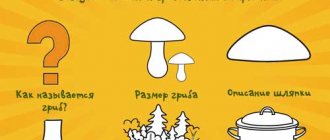Summary of educational activities for speech development “Journey to School”
Goal: developing the communicative competence of preschoolers.
Tasks:
1. Correctional - educational: - Expansion, clarification, updating of the dictionary on the topic “School supplies”. - Improving the grammatical structure of speech (inflection skills, word formation) 2. Correctional - developing: - Development of general and fine motor skills, coherent speech, thinking, imagination; - Development of spatial orientation: 3. Correctional - educational: - Nurture in children the skills of cooperation, a sense of responsibility, accuracy, initiative, independence. Equipment: school supplies, bell, laptop (with a recording of the song “What do they teach at school?”), ball, mnemonic diagrams (sound, letter), red circles, “diaries” on the board and for children (sheet with names of lessons) , counting sticks.
Progress of the lesson.
1. Organizational moment.
- Let's smile at each other and everyone will say hello to their neighbor, calling him by his affectionate name. - Having guessed the riddles, you will find out what we will talk about today.
- I look like a box, you put your hands in me. Schoolboy, do you recognize me? Well, of course, I -... (pencil case)
If you perfect it, you can draw whatever you want: the Sun, rivers, mountains, beach. What is this? (pencil)
Now I'm in a cage, now I'm in a line. Be able to write about them! you can also draw What am I... (Notebook)
If you give her a job, the pencil was in vain. (Rubber)
I’m ready to make the whole world - a house, a car, two cats. Today I am the ruler - I have... (Plasticine)
I'm big, I'm a student! In my backpack... (Diary)
There is a house: Whoever enters it will acquire intelligence. (School)
- Well done, guys, everyone guessed the riddles! Who guessed what awaits us today? — Would you like to be at school now? Now I will say the magic words and you will all turn into schoolchildren. Shall we try? Close your eyes. - Spin around, spin around, you’ll all turn into schoolchildren. That's it - now you are real students - first graders. And this is our class. It has desks, a blackboard and even a grade book. — What are the names of the children who study at school? (students) - Who teaches the children? (teacher). -I will be the teacher, and you will be my students. — We will have 5 lessons and for each lesson we will receive grades. Agreed?
The bell rings. Lesson 1 - literacy.
I will make different sounds, if you hear the sound A , clap your hands. (A, O, U, O, Y, A, O, U, I, Y, A, O) -And now let’s play the game “Traffic Controllers.” I will pronounce words, if you hear that a word begins with the sound A , raise the red circle. (Orange, house, onion, pineapple, Anya, varnish, bus) - The Evil Sound Eater ate the first sounds of A in words. You need to know these words. - Think of words that begin with the sound A. (children call in a chain). - Look at the diagram. We hear sounds with our ears and pronounce them with our mouths. (Ear-mouth diagram) - The sound A is denoted by the letter A. (A letter is set). (Eye-letter diagram) I suggest you write the letter A in the air, and now we will lay out the letter A from sticks. - The lesson is over. Well done! Let's put 5 in our diaries! (Children stick 5 in their “diary”, and the speech therapist is on the board)
Call. Physical education lesson.
F/minute:
One, two, three, one, two, three - (movement in a circle with a sporty step) We came to visit the school. We stand on our toes - (walking on our toes) And grow, grow, grow - arms (slowly raising our arms up) We stand up and squat - (children squat and stand up one by one) And we won’t get tired at all. We’ll grow up a little - (torso tilts left - right) We’ll be happy to go to school - (I keep walking in a circle).
- Well done. We give ourselves a 5 in physical education, the next lesson is mathematics.
In this lesson, you and I will count the school supplies that we cannot do without at school. (counting to 5 with the words pencil, pen) -And now I propose to play the game “One - Many.” Children, in a chain, take objects (school supplies) and say: “I have an eraser, but there are erasers in the store,” pencil - , pen - , album - ,
Well done! Now let's compare the objects: Game "On the contrary"
The pencil is short, and the ruler is .... (long) The notebook is thin, and the book is .... (thick) The eraser is small, and the pencil case ..... (large) The album is light, but the briefcase ... (heavy) The green pencil is sharp, and the blue ... (blunt)
-Now let's count the syllables in words (ruler, pencil, pen, chalk, plasticine). Which word is the longest, shortest? - The lesson is over. Well done! Let's put 5 in our diaries! (Children stick 5 in their “diary”, and the speech therapist is on the board)
Call. Turn.
the game “Big-small” with the ball .
I name a word - an object and throw a ball to one of you. The one who catches the ball calls it affectionately. Paints, pencil-, notebook-, book-, ruler-, pencil case-, brush-, eraser-, plasticine, paperclip-, button-.
The bell rings for class. The next lesson is natural history.
What do you think is being taught in this lesson? (children’s answers) The lesson will not be ordinary, we will solve tricky “Trick Riddles”
In winter, in a den, he dreams of a Shaggy, Clubfoot...elephant (bear)
The fastest one rushes out of fear... is the tortoise (hare)
Even a foreigner knows that everyone in the forest is more cunning than the hare (fox)
A simple question for kids: “Who is the cat afraid of?” ...mice (dogs)
The whole street heard the chicken (cow) mooing.
Game “Does this happen?”
Correct the mistakes.
Pupils go to school at night. You can take pajamas to school. The pencil case was put in Dasha’s briefcase. The primer is read by the student. Vova was cutting paper with scissors. - The lesson is over. Well done! Let's put 5 in our diaries! (Children stick 5 in their “diary”, and the speech therapist is on the board)
Music.
Children take comfortable positions (on the carpet). I suggest you listen carefully to the song called “What do they teach at school?” — What did you learn from the song about what they teach at school? (Children answer) - The lesson is over. Well done! Let's put 5 in our diaries! (The children stick 5 in their “diary”, and the speech therapist is on the board) - And now it’s time for us to go back to kindergarten. Let’s say our magic words: “Spin around, spin around, turn into a preschooler!” Here we are in the garden!
Lesson summary:
— Today we visited school. I want you to answer the question of whether you want to go to school and why. (The bell “goes” in a circle) Children pass the bell around in a circle and express their opinion:
-I want to go to school because... or - I don’t want to go to school because.....
-Very soon you will all go to school, where the first teacher will meet you. For you, she will be the smartest, most beautiful, kind and strict, caring, like a mother. I am sure that you will study only with an “A”!!
— To remember our trip, we will take a photo with our “diaries.” You will see the photo on the stand in your group. I will also give you colored pencils that you can use in your group to draw in your free time.
Author: Olga Petrovna Zykova, speech therapist teacher, MBDOU d/s “Rybka”, Tomsk region, Asino, Russia
The article is published in the author's edition
What and when to tell your child about school
Author:
Anna Basinger
child and family psychologist
What and when to tell your child about school
When talking about preparation for school, it is impossible to ignore the aspect of a child’s psychological readiness and motivation. This is just as important (and sometimes much more) as the knowledge and skills that the child has formed at the time he begins education. It's no secret that the most effective driving force in any business is desire! A person who really wants something will definitely find a way to realize it. The same is true with studies. A child who knows how to read, write and count, but is afraid of school, does not want to study, and so on, often finds himself in a worse position than one who does not know how to do anything yet, but really wants to learn and believes that school is that magical place where will they teach him this?
You can say that a lot depends on the teacher. Yes, of course it is. But not only the teacher influences the student, but also the student influences the teacher. A child who is passionate about learning is the joy of any teacher, and most likely their relationship will work out well. Well, an eternally dissatisfied and negatively-minded student will most likely cause irritation, which will ruin relationships and negatively affect the learning process.
So how can you ensure that your child comes to school fully armed? Namely with interest, trust and desire to learn? The first thing you need to do is to analyze your own attitude towards the school (your own, the one you send your child to, the school as a public institution), as well as the attitude of other family members, since all this will latently influence the image of the school , formed in the future student. If it turns out that you yourself are afraid of school and don’t like it (or have some other negative attitude towards it), try to figure out why this happened. Is your attitude a consequence of the experience or public opinion of the group to which you belong? After that, you will need all your creative and intellectual abilities to reconsider this attitude. This does not mean that you should rush from one extreme to the other, certainly not. What is important for you to develop is a respectful and interested attitude towards the school to which you are going to send your child.
The second part of the big work on psychologically preparing a child for school will be your conversations with him about it. Children are often afraid of the unknown, so it is best to start conversations about future learning early so that the child can ask everything and get used to the new idea. In such conversations, it is important to describe in as much detail as possible how the child’s life at school will work. There is no need to exaggerate and say “that school is not a kindergarten for you - you have to work there.” School is something new and interesting. This is a new status, this is responsibility, which means more trust in the child (since they have been entrusted with learning). School means new friends and new interesting knowledge, teachers who are ready to help and tell. Here it is also important to explain that asking if you don’t understand is not a shame, but on the contrary, it is helping the teacher. If you have any interesting, funny, educational memories about school, tell your child. Maybe dad or grandma has a story to tell.
And finally, the third component is the formation of the child’s cognitive interest. What it is? In a broad sense, it is curiosity about the world and people. A child who is interested in everything will never be bored. Now there are a huge number of educational games, programs that tell about everything, any information can be found on the Internet. Be curious with your child. Share with him what interests you. This will also give him the feeling that the world is a wonderful and interesting place.
If you manage to do all this, not only will your school and university years pass easily and successfully, but your whole life will be filled with the joy of learning. Curious children grow into passionate, never-bored adults! What could be better!
“How to find yourself in the school of your dreams” Thursday, June 18, from 16.00 Moscow time
Lesson questions:
- How to create an image of “your” school
- How to find the right school
- What to do if the school where your child is suffering is not much like your dream
Registration is free.
Answers to questions from the first readers of the article
Question:
And if a child is used to getting knowledge from the Internet and other things, then even the smartest teacher will not be able to know more and tell better, won’t it be boring at school?
Maria Cheredilina answers:
Full-fledged education of a preschooler on the Internet is doubtful. A child can play educational and educational games, watch cartoons and films according to age, find interesting information, but - and it is important for parents to understand this - all this does not replace systematic learning, mastering new types of activities and methods of action (reading, diagramming, designing, etc.) .d.). The transition to systematic learning is fundamental in a child’s life and is associated not only with the acquisition of knowledge and skills, but also with a restructuring of motivation and self-awareness.
Make an effort to help your child learn new things and challenge himself in different types of activities, as well as to find “their” school and teacher who will support the child’s cognitive interest and help him learn new cultural ways of doing things.
Question:
Children are gullible, we, as parents, convince them that there is a magical world at school - and then disappointment will quickly set in.
Maria Cheredilina answers:
The author of the article does not recommend idealizing school. It is enough, as Anna wrote, to create a respectful and interested attitude towards school, and also, I would add, a responsible attitude of the child towards learning. And, of course, the school where you send your child should evoke respect and sympathy from you personally. If this is fundamentally impossible, you can use alternative learning paths
Do exercises to prepare for school from Ikyusha
Mathematics
Reading
The world
Logics
English language
Physical training
A first-grader will spend a lot of time on the move: the road to school, recess, outdoor games, so cultivate physical endurance in children.
In this endeavor, a personal example is important: move, spend time with children outside, play active games. If possible, send your child to a sports section before starting school. This way the baby will get used to regular classes and systematic physical activity.
Compliance with the daily routine can also be attributed to such preparation. Children who have not been accustomed to this find it much more difficult to adapt to the school routine. This is especially true for preschoolers who do not attend kindergarten. At least a few months before school, start waking up your child at the same time, and also try to organize meals, getting up and going to bed on a clear schedule.
Teach preschoolers discipline: washing and dressing themselves, making the bed, putting away toys and books. To do this, come up with an exciting game where all actions will become part of a big adventure quest: complete them at speed, earn bonuses, share achievements with each other, add funny rituals. Be sure to praise your child if he did it faster than usual, and support him if he was a little late today. The main thing is to maintain a good mood! In this playful form, you can unobtrusively accustom a preschooler to a routine and later to get ready for school independently.
Intellectual development
This is not only the ability to read, write, count (after all, this can be taught at school). It is more important to teach a child to reason, compare facts, be able to express his thoughts and give reasons for them.
This will require logic and speech. Logical thinking helps to analyze and compare information, find and apply non-standard solutions, and developed speech will allow you to communicate more comfortably in a team and in class. The child will be able to easily express his thoughts and defend his point of view. Then communication will bring pleasure and joy.
School preparation program from IQshi
The website for the harmonious development of IQsha will help you effectively prepare for school, anywhere in the world. IQsha offers many exercises in a playful way to develop logical thinking, speech, reading, and counting skills. This way you can diversify the learning process and make it easier and more fun.
The most important thing is to be attentive and patient with your child, take into account his wishes, and do not race for success, looking at the achievements of other children. First of all, it depends on the parents what kind of attitude the future first-grader will have towards school. Be warm, accepting mentors, talk to your child more often and be interested in what emotions he is experiencing, trying to show as much participation as possible. Don't make school preparation your number one goal. Play, walk, have fun and turn your lessons into fun, playful activities that will help you develop your skills in a fun and stress-free way.
How to prepare your child for school on your own?
Studying at school changes the entire routine life of a child. Is it possible to prepare your baby for a new stage on your own? Certainly! The main thing is to stock up on time, desire and patience. Preparing for school is a long process, which consists not only of learning to read and write, but also of psychological support for the future first-grader.
When choosing to prepare for school in a developmental studio or preparatory class, it is important to understand that only knowledge can provide there. They do not teach discipline and daily routine. But the preparation itself in the studio is more effective, because the preschooler is in a group and quickly learns new information.
For busy parents, there is another alternative - online classes. Is it possible to entrust this important process to online child development services and be confident in the results? More likely no than yes.
The advantage is that the child will study independently, because all classes are designed in an accessible and fun way. But adults must monitor the learning process and check how well the preschooler learns information.
Therefore, online services are excellent assistants, but they cannot completely replace classical training. The best training option is combined, when the child studies at home and in a preparatory studio or on child development sites.








